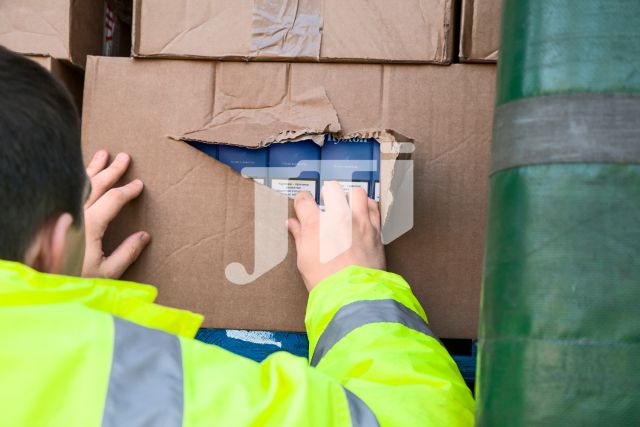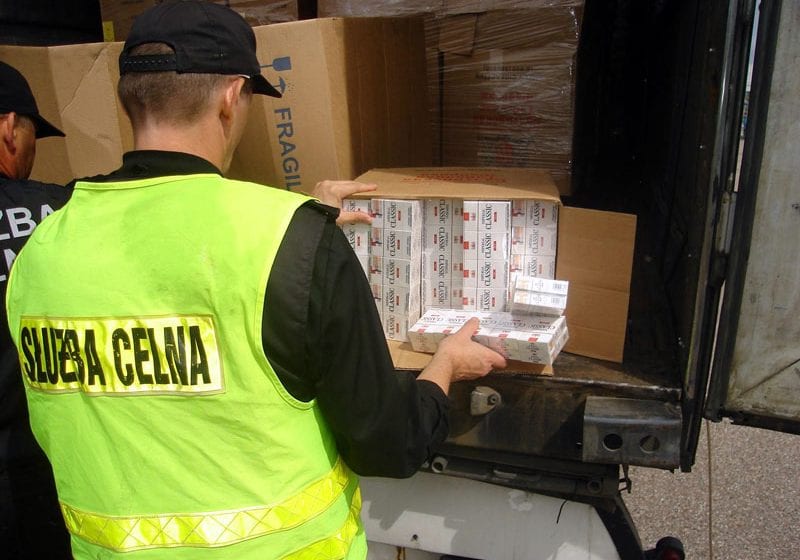A Spanish member of the European Parliament wants to know how much is being ‘lost’ to tobacco smuggling.
In a preamble to questions posed to the Commission, José Ignacio Salafranca Sánchez-Neyra said tobacco smuggling was one of the leading types of fraud causing huge losses to the EU budget.
With that in mind, he asked the Commission:
1) Whether it was taking any measures, in conjunction with member states, to curb this illegal practice.
2) And whether it had any figures/percentages for the amounts lost to fraud; and if so, what were the figures for 2017.
These questions are due to be answered by the Commission in writing.
Tag: European Union

A question of fraud

Fictional deliveries
The European Commission has said that it is aware of the limitations of currently available methods for the measurement of cigarette deliveries of tar, nicotine and carbon monoxide.
It said that this issue was carefully considered during the revision of the Tobacco Products Directive (TPD) and that it was concluded there was insufficient evidence that would support the revision of the existing provisions.
The Commission was responding to a question that was based on a study by the Dutch National Institute for Public Health and the Environment (RIVM). The RIVM researchers found that the amount of tar, nicotine and carbon monoxide delivered was at least twice as high as manufacturers claimed it was.
The Commission said the results presented recently by the RIVM were in line with the measurements conducted by Hammond et al. in 2006, which indicated that ‘none of the smoking regimens currently in use adequately “represent” human smoking behaviour and none are significantly associated with measures of nicotine uptake among human participants’.
‘As the Commission pointed out in its replies to written questions E-003557/2017 and E-001317/2018, Article 4(3) of TPD empowers the Commission to adopt delegated acts to adapt the measurement methods, based on scientific and technical developments or internationally agreed standards,’ the Commission said. ‘The Commission will report on the application of the TPD by 2021.’
Counterfeit combat
A French member of the European Parliament has asked the Commission how it intends to involve consumers in the fight against counterfeiting.
In a preamble to three questions, Jérôme Lavrilleux said that a study by the European Intellectual Property Office (EUIPO) had found that counterfeiting costs the European economy almost €60 billion.
‘The EUIPO estimates that counterfeit products account for up to five percent of the EU’s imports, valued at €85 billion per annum,’ said Lavrilleux.
‘In addition, measures against imports of such products seem feeble in relation to the amounts of money and quantities of goods involved.
‘According to Commission figures, customs services intercepted 41 million items of counterfeit goods in 2016. The total value of the equivalent genuine products would have been in the region of €672 million.
‘This poses a serious threat to IPR-intensive sectors, which account for 42 percent of European GDP and 28 percent of employment in the European Union. Nearly 434,000 jobs are directly threatened.’
Lavrilleux asked:
‘How will the Commission step up measures to combat counterfeit products at EU and member state levels?
‘Does the Commission intend to strengthen the regulatory framework and harmonise national legislation so that they become stronger deterrents?
‘How will the Commission make consumers more aware and involve them more in combating counterfeiting?’
Lavrilleux’s questions are due to be answered by the Commission in writing.
A question of smuggling
A German member of the European Parliament has asked the Commission what it is doing to combat the smuggling of tobacco products.
In a preamble to his question, Wolf Klinz said the EU was confronted with the smuggling of tobacco products across its eastern and southern borders, and, because of the low prices of these products, with the undermining of the EU’s efforts to limit smoking.
He asked whether the Commission was aware of the smuggling methods and the organised groups behind the smuggling, and what the Commission was doing to combat the smuggling.
The Commission is due to answer in writing.E-cig information requested
The European Commission has been asked to provide information on the implementation within EU member states of the Tobacco Products Directive in respect of electronic cigarettes.
Roberta Metsola, a Maltese member of the European Parliament said in a preamble to her request that a top Greek court had decided that the advertising of e-cigarettes and their use in public places should be covered by the same laws as applied to traditional cigarettes and smoking.
Metsola said that, in its reply to a previous question, the Commission had stated that ‘Article 20 of the Tobacco Products Directive contained requirements relating to safety, quality and consumer protection of electronic cigarettes’.
The Commission had stated also that it was monitoring regulatory developments relating to electronic cigarettes. In this respect, it remained in close contact with member states to enable the exchange of available information and experience, by means of different forums, including the Expert Group on Tobacco Policy, its Subgroup on Electronic Cigarettes and the upcoming Joint Action on Tobacco Control.
Metsola asked whether the Commission could already provide information on the implementation within EU member states of the Tobacco Products Directive in respect of e-cigarettes.
The Commission is due to reply in writing.
Spending questioned
An English member of the European Parliament is seeking to discover how much EU taxpayers’ money has been spent so far this century in trying to get people to quit smoking.
Without giving a preamble to his question, Tim Aker asked the European Commission to ‘set out, broken down both by organisation and year-by-year since 2000, just how much money has been paid by the Union under whatever budget heading to stop smoking?’
The Commission is due to reply in writing.
A matter of timing
A member of the European Parliament has suggested that the European Commission would be putting the commercial interests of tobacco manufacturers before the health interests of EU citizens if it issued a legal challenge to Belgium’s proposal to ban menthol cigarettes.
In a preamble to his question, the Belgian MEP Philippe Lamberts said the purpose of the EU’s Tobacco Products Directive was better to protect consumers, particularly young people, by considering new scientific knowledge and legislating on new tobacco products, including e-cigarettes.
Specifically, the TPD banned the sale of menthol cigarettes from May 20, 2020.
‘Tobacco use is the most common cause of premature death in the EU,’ he said. ‘On average, 700,000 smokers die each year and smokers die 14 years earlier than non-smokers. That figure is almost 20 times higher than the number of premature deaths caused by fine particulate nitrogen oxide emissions, the dangers of which came to light during the “dieselgate” scandal. Of people aged between 15 and 24 years old, 29% are smokers.’
Lamberts said the Belgian press had reported that the Commission was threatening to bring legal action against the Belgian Government because it was seeking to ban the sale of menthol products before 2020. (See the June 18 story: Brussels threat to Belgium)
‘In doing so, the Commission would be putting the commercial interests of manufacturers before the public health interests of EU citizens,’ he said.
He then asked:
‘What is its justification for that stance?’; and
‘Is the Commission’s position not contrary to Article 9 of the Treaty on the Functioning of the European Union, which provides that “in defining and implementing its policies and activities, the Union shall take into account requirements linked to (…) a high level of (…) protection of human health”?’
The Commission is due to reply in writing.
Delivering confusion
Smokers inhale much higher doses of harmful substances than is ‘stated on cigarette packs’, according to a story by Janene Pieters published in the NL Times and citing a study by the Dutch public health institute RIVM.
The story goes on to say that the researchers found that the amount of tar, nicotine and carbon monoxide delivered is at least twice as high as manufacturers ‘claim’.
This comes about because of a long-running debate about how cigarettes are and should be tested. Some people believe that they should be tested with ventilation holes open, while others say that the ventilation holes should be blocked. The former testing method, approved in the EU, gives lower readings than does the latter method.
The crux of the matter seems to be that, originally, such testing was not meant to give absolute values of tar, nicotine and CO deliveries, but relative values.
A spokesperson for Philip Morris was quoted in the story as saying the testing “is not intended to measure individual exposure, but to make a comparison between cigarette brands”.
The spokesman was quoted as saying also that if another measurement were to be used in the EU, the maximum allowable values would have to be adjusted. The limits currently are 10 mg of tar, 1 mg of nicotine and 10 mg of CO per cigarette.
Referring to the researchers’ findings, the Netherlands’ State Secretary for Public Health said he was “shocked by these hard facts,” even though the expectation was that tobacco smoke would turn out to be more harmful than ‘the packages suggest’.
Blokhuis called it “very worrying that with all cigarettes smokers actually get a lot more poison in than they are told”.
He is advocating for cigarettes in the EU to be “measured without any tampering”.
However, when the EU Commission brought in its revised Tobacco Directive in May 2016, it said that the tar, nicotine and CO (TNCO) labeling on cigarettes and RYO tobacco would be replaced with an information message that informs consumers that ‘Tobacco smoke contains over 70 substances known to cause cancer’.
Additionally, it said that research had shown that TNCO labeling was misleading to consumers because it made them believe that some products were less risky than were others to their health.
It said the new information message would more accurately reflect the true health consequences of smoking.
The lobbying circuit
A report released today by Forest EU is said to shine a light on the network of anti-tobacco lobby groups in Brussels and how the European Commission funds them with taxpayer’s money to achieve the Commission’s own policy goals.
Forest EU describes itself, in part, as ‘a campaign that informs smokers about the issues that affect them in the European Union’.
“The report identifies at least 24 different organisations operating in Brussels pushing for more pervasive anti-tobacco policies,” said Guillaume Périgois, director of Forest EU. “These organizations are staffed with 94 lobbyists and have a self-declared lobbying budget of between €5 and €6 million as per the EU Transparency Register. Far from David vs Goliath, it’s Goliath vs Goliath.
“The report also sets out how in 2016 €6 million of EU taxpayer’s money was channelled to these organizations by the European Commission to lobby in favour of policies which the Commission has put forward. For us, such funding amounts to government lobbying government and does not promote transparent policy making.”
Meanwhile, Michael Jäger, secretary general of the Taxpayers Association of Europe (TAE), said that it wasn’t necessary to like smoking to see there was a problem with the Commission giving taxpayers’ money to NGOs who then use that money to lobby the Commission.
“With the EU budget under increasing pressure it doesn’t make sense for the Commission to spend public money like this,” he said.
The report makes several recommendations including one that would see a clause included in all new and renewed Framework Partnership Agreements and grant agreements that would limit the ability of fund recipients to use the funds received for lobbying activities, while encouraging the delivery of concrete health outcomes.
Heated tobacco warning
A scientist and health advocate says it is important that the European Parliament is presented with the available evidence that heated tobacco products ‘remain both harmful and highly addictive’.
Writing an opinion piece in The Parliament Magazine, Professor Charlotta Pisinger said that no product that damaged the lungs and human health should be promoted to young people across the EU, especially in the ways these new products were presented.
‘As Chair of the European Respiratory Society (ERS) Standing Committee on Tobacco Control, I will present my research findings to the European Parliament in Strasbourg on the 30th May, alongside MEP Gilles Pargneaux and the European Network for Smoking and Tobacco Prevention (ENSP), on the occasion of World No Tobacco Day,’ she said.
‘Independent research suggests that there is a substantially higher health risk than claimed by the tobacco industry.
‘I have discovered that tobacco companies have not informed the public that some harmful substances – such as particulate matter, tar, acetaldehyde (a carcinogen), acrylamide (a potential carcinogen) and an acrolein metabolite (toxic and irritant) – were found in high concentrations in their studies.
‘Some studies also found much higher concentrations of formaldehyde (a potential carcinogen) in heated tobacco products than in conventional cigarettes.’
New Heated Tobacco Products: No Smoke, No fire? hosted by MEP Gilles Pargneaux is due to be held from 13:30 to 15:30 on May 30 at the European Parliament in Strasbourg, room Louise Weiss N3.5. Registration is at: https://forms.ersnet.org/new-heated-tobacco-products.








